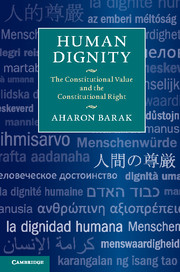Book contents
- Frontmatter
- Contents
- Preface
- Acknowledgements
- Table of Cases
- Part I Fundamental concepts and sources
- Part II Human dignity as a constitutional value
- 5 Purposive constitutional interpretation
- 6 The role of human dignity as a constitutional value
- 7 Three types of model for determining the content of the constitutional value of human dignity
- Part III Human dignity as a constitutional right
- Part IV Human dignity in comparative law
- Bibliography
- Index
- References
5 - Purposive constitutional interpretation
Published online by Cambridge University Press: 05 February 2015
- Frontmatter
- Contents
- Preface
- Acknowledgements
- Table of Cases
- Part I Fundamental concepts and sources
- Part II Human dignity as a constitutional value
- 5 Purposive constitutional interpretation
- 6 The role of human dignity as a constitutional value
- 7 Three types of model for determining the content of the constitutional value of human dignity
- Part III Human dignity as a constitutional right
- Part IV Human dignity in comparative law
- Bibliography
- Index
- References
Summary
Human dignity as a constitutional value and constitutional interpretation
Is human dignity a constitutional value? This is the question that I shall examine in this chapter. The answer to this question is interpretative. It is subject to interpretational tools. We must answer the question through a holistic interpretation of the constitution – each constitution according to its own interpretation. There is no single interpretive method for understanding the constitution. However, comparative constitutional experience indicates that there are three primary approaches to constitutional interpretation. The first method is interpretation according to the intent of the constitution’s framers: Intentionalism. Intentionalism’s answer to the question of whether or not human dignity is a constitutional value will be decided according to the intention of the constitution’s framers. The second interpretive method, which is prominent in American constitutional law, is interpretation according to the original public understanding: Originalism. Human dignity is a constitutional value, according this approach, if that was society’s understanding at the time of the constitution’s adoption. The third interpretative method is the functional approach: Purposive Interpretation. Human dignity is a constitutional value if that is what is indicated after assessing the role, the function and the purpose that the constitution fills at the time of interpretation. Dworkin provided another important theory of constitutional interpretation. Due to its intricate nature, I will not delve into it in this book. In principle I would argue – and it certainly is open to argument – that Dworkin’s approach presents a specific aspect of purposive interpretation. The same holds true for Posner’s pragmatism. For the purposes of this book, I see it as an aspect of purposivism. The same is true for the American approach called The Living Constitution.
I shall focus on purposive constitutional interpretation. This is the accepted interpretative approach in many modern democracies. I shall address the details of this method so far as they pertain to constitutional interpretation generally, and to the interpretation of “human dignity” within a constitution specifically. As we shall see, purposive interpretation considers both the intent of the constitution’s framers and the original public understanding. However, it does not attribute significant weight to either of them. Decisive weight is given to the fundamental purpose underlying the constitution at the time of interpretation. I shall discuss this later in the book.
- Type
- Chapter
- Information
- Human DignityThe Constitutional Value and the Constitutional Right, pp. 69 - 102Publisher: Cambridge University PressPrint publication year: 2015
References
- 1
- Cited by



